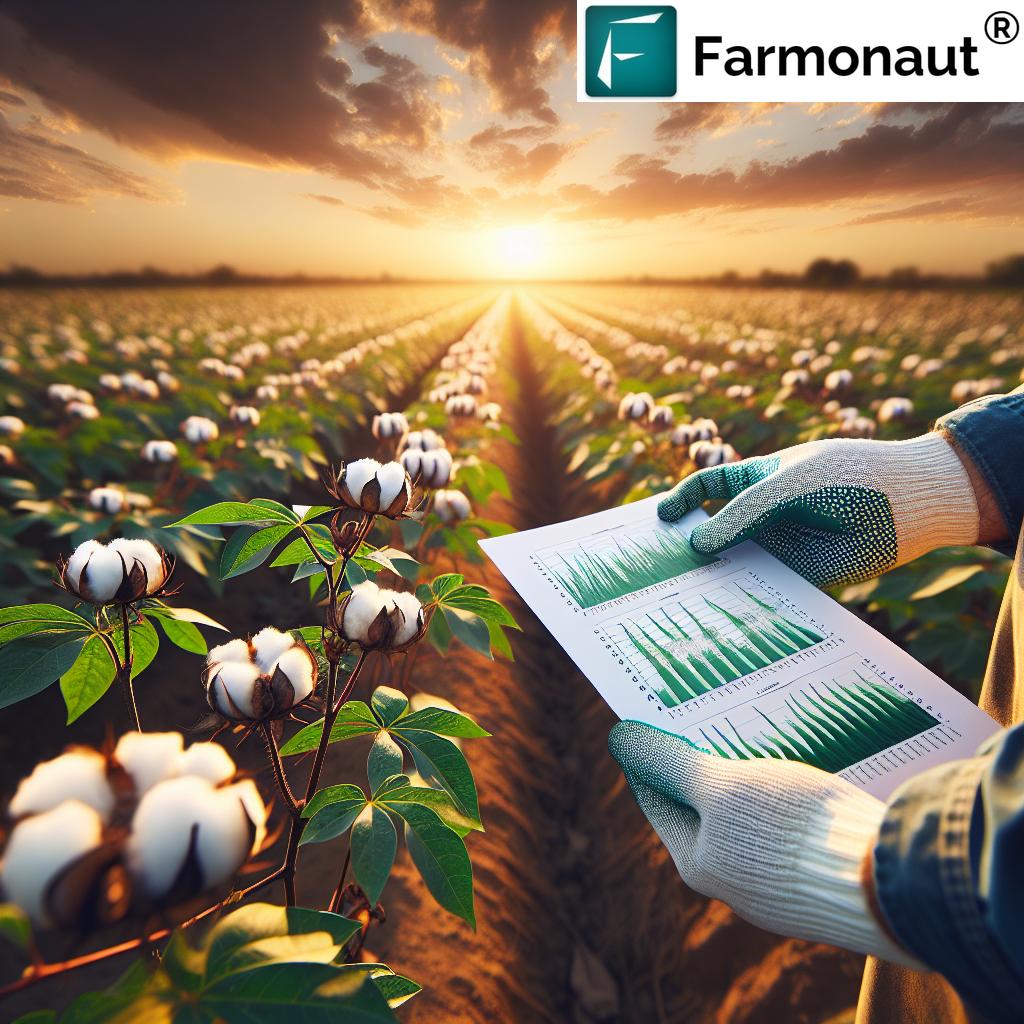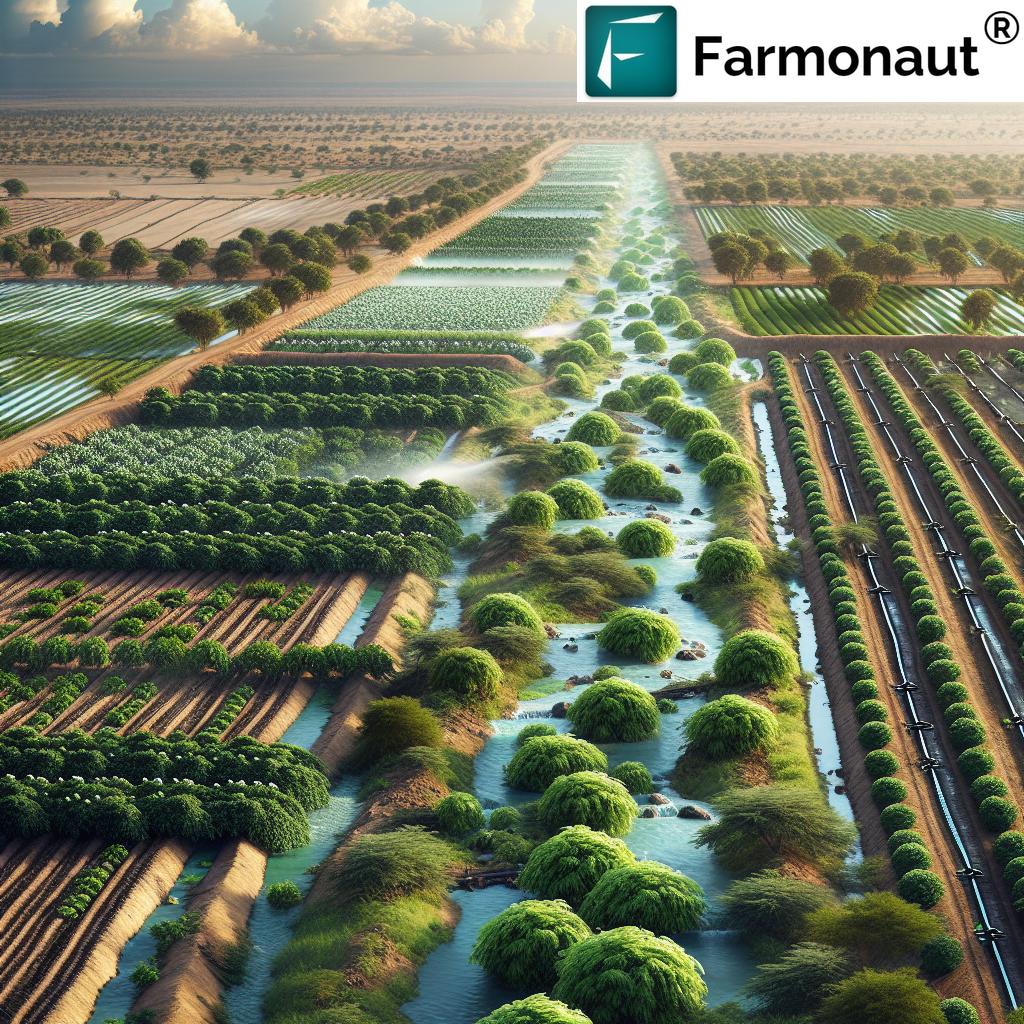Cotton Farming in Israel: 7 Key Innovations for Yield
Table of Contents
- Fun Fact: Did You Know?
- Historical Overview of Cotton Farming in Israel
- Advanced Cultivation Practices in Israeli Cotton Farming
- Comparative Innovations Impact Table
- Cotton Quality Standards and Traceability
- Market Impact and Global Trade of Israeli Cotton
- Challenges Facing Cotton Farmers in Israel
- Farmonaut: Empowering Precision Agriculture in Cotton Farming
- Another Interesting Trivia!
- Frequently Asked Questions
- Conclusion
★ “Israeli cotton farms use 90% less water per acre thanks to advanced drip irrigation technology.” ★
Cotton farming in Israel is a compelling example of how rigorous agricultural techniques, unwavering commitment to sustainability, and the embrace of advanced technology can transform an industry. Although its scale is modest relative to global giants, Israel’s cotton industry garners international recognition for quality, environmental stewardship, and innovation. Here, we journey through the historical evolution, modern methods, and focus on seven pivotal innovations driving yield optimization and sustainable cotton production in Israel.
Historical Overview of Cotton Farming in Israel
The historical tapestry of cotton cultivation in Israel dates back to the early 1900s, fueled by ingenious adaptation to arid environments. The industry truly blossomed in the mid-1980s, when approximately 600,000 dunams (equivalent to 150,000 acres) were under cultivation. By employing unique agricultural practices, farmers managed to turn a challenging landscape into thriving, productive fields.
Yet, due to changing market trends, evolving irrigation needs, and growing focus on sustainability, the cultivated area has gradually decreased. Current figures hover around 150,000 dunams (about 37,500 acres). While this reduction might appear as a setback, it is, in fact, a testament to the industry’s ability to adapt, innovate, and maintain its reputation for producing some of the world’s finest cotton.
Advanced Cultivation Practices in Israeli Cotton Farming
The distinguishing feature of Israeli cotton farming is the embrace of technological solutions that allow farmers to optimize yield and fiber quality while addressing environmental challenges. Let’s examine the pivotal innovations and practices that underpin Israel’s extraordinary agricultural success.
1. Drip Irrigation in Agriculture: Water-Smart Cotton Solutions
At the forefront of cotton farming in Israel is the pioneering use of drip irrigation. Unlike flood or overhead methods, drip systems deliver water directly to cotton plant roots. This innovation offers several critical benefits:
- Water Conservation: Over 50% reduction in water consumption compared to traditional irrigation.
- Efficiency: Minimizes evaporation and runoff, maximizing efficiency.
- Precision: Supplies moisture exactly where and when needed, optimizing plant health for yield.
Israeli cotton farmers have set a global standard by integrating advanced drip networks not only for water delivery but also for nutrient application—a practice known as fertigation. With arid climates and limited water, these precision irrigation methods are a lifeline, directly contributing to the sustainability and high quality of Israeli cotton.
- Water management in cotton farming ensures a remarkable balance between maximum productivity and ecological stewardship.
2. Integrated Pest Management (IPM) Cotton: Protecting Yield Responsibly
Recognizing the impact of uncontrolled pests on cotton yield and quality, Israel’s farmers have adopted a comprehensive Integrated Pest Management (IPM) approach. Core components include:
- Regular pest scouting: Monitoring fields for early detection and precise intervention.
- Biological control methods: Introduction of predatory insects and beneficial organisms to control pests naturally.
- Judicious pesticide usage: Chemical applications only as a last resort, leading to more than 50% reduction in chemical use across farms.
Integrated pest management cotton systems emphasize environmental and human safety, reduce risk of resistance buildup in pest populations, and help protect non-target species. This method exemplifies how farmers in Israel implement science-driven strategies to secure sustainable cotton production while maintaining cotton quality standards.
3. Precision Agriculture Techniques: Data-Driven Cultivation
Precision agriculture techniques are integral to cotton farming in Israel. Harnessing a combination of field sensors, weather data, and—crucially—satellite imagery, farmers and managers continuously monitor systems to:
- Assess crop health, identifying stressed zones via indicators like NDVI (Normalized Difference Vegetation Index).
- Optimize inputs (e.g., irrigation water, fertilizers, and pesticides) on a zone-by-zone basis, greatly reducing waste and environmental impact.
- Plan farm operations more efficiently, using geo-referenced data for sowing, irrigation, and harvesting activities.
Global adoption is being rapidly accelerated thanks to affordable, accessible solutions. For example, at Farmonaut, we empower farmers with toolbox-level carbon footprinting, satellite crop plantation and forest advisory, and AI-based field resource management tools accessible via browser, Android, and iOS.
- Such innovations have already led to up to 30% increases in cotton yield over the past decade in Israel.
Blockchain-based traceability technology is also making waves in the cotton supply chain. For textile and fashion industries, as well as the spinning mills themselves, traceability in cotton supply chain—ensuring each bale can be tracked back to its field of origin—supports both sustainability and brand trust.
4. NDVI-Based Defoliation Timing: Maximizing Fiber Quality
Accurate, timely defoliation is essential for maximizing both yield and fiber quality before cotton harvest. Israeli scientists and farmers employ satellite-derived NDVI data, which measures the difference between visible and near-infrared light reflected by plants to assess real-time vegetative health.
- Spectral NDVI readings inform the timing of defoliant application, precisely targeting when the crop is most ready for harvest.
- This not only boosts output, it reduces the risk of fiber contamination and ensures consistency in quality standards demanded by the global market.
Smart use of NDVI-based insights reduces human error, limits unnecessary chemical use, and streamlines the overall harvest process—a winning formula credited in cotton farming in Israel.
5. Traceability in Cotton Supply Chain: Ensuring Quality from Field to Mill
Traceability in the cotton industry safeguards both quality standards and compliance with environmental requirements. In Israel, the traceability system is robust and technology-enabled.
- Each cotton bale is assigned an identity card, which records data from seed variety to harvest date and processing.
- This traceability is secured using advanced software—sometimes even blockchain—to ensure data cannot be tampered with and is accessible to partners throughout the cotton supply chain.
- For retailers and brands, the Israeli system means full transparency—every step of the process, from field to spinning mill, is documented with unprecedented clarity.
This level of visibility raises the bar for global cotton standards, strengthens market position, and answers the modern consumer’s call for social and environmental accountability.
6. Drought Resistant Cotton: Cutting-Edge Research in Israel
Climate volatility is a mounting challenge. Drought events have intensified, pushing research institutions in Israel to pursue genetic resistance to water scarcity. Recent breakthroughs include:
- The identification of genes from wild cotton relatives with enhanced water absorption traits.
- Ongoing breeding efforts aiming to boost resistance and increase water use efficiency by at least 10%—incredibly valuable in arid Middle Eastern conditions.
As this research progresses, it is expected to further fortify the resilience and sustainability of Israeli cotton, melding tradition with innovation.
7. Focus on Sustainability and Environmental Stewardship
Israel’s cotton industry stands out in the global market for its systematic approach to environmental sustainability:
- Israeli cotton producers are 100% participants in the Better Cotton Programme, meeting rigorous standards for sustainable production.
- The Israel Cotton Production Standard System (ICPSS) is recognized as equivalent to the internationally celebrated Better Cotton Standard System (BCSS).
- Water management systems ensure that over 80% of domestic wastewater is recycled for agricultural use— a remarkable achievement in environmental stewardship.
By innovating at every step, Israel’s approach reduces negative environmental impacts while producing top-quality cotton, benefiting both farmers and the global community.
Comparative Innovations Impact Table: Cotton Farming in Israel
★ “Precision agriculture in Israel has boosted cotton yields by up to 30% over the past decade.” ★
Cotton Quality Standards and Traceability
The pursuit of quality is foundational for cotton farming in Israel. The Israel Cotton Board (ICB) ensures stringent standards from field to fiber, including:
- Field-to-Bale Traceability: Every bale is linked to its identity card, containing location, variety, harvest timing, and management information.
- Systematic quality checks at every stage mitigate risk of contamination and non-compliance with global market requirements.
- Certification of Sustainability: With universal adoption of the Better Cotton Production Programme, Israeli farmers have their cotton recognized as both eco-friendly and socially responsible.
This robust traceability is further supported by digital systems, and, increasingly, by blockchain technology. Solutions like Farmonaut’s traceability tools make it even easier for all supply chain stakeholders to maintain transparent, tamper-proof data records.
Developers and agribusinesses who need direct access to this kind of farm data and analytics can use the Farmonaut API or explore API documentation for integration into enterprise or research systems.
Market Impact and Global Trade of Israeli Cotton
While current figures place Israel’s cultivated cotton area at around 150,000 dunams, the impact on the global cotton market is significant:
- Exports: In 2023, Israel exported cotton seeds with total value reaching $3.36 million, mainly to the United States.
- Responsive Market Expansion: Higher global cotton prices have prompted farmers to increase planting—jumping from 27,000 dunams in 2021 to 90,000 dunams in 2023.
- Quality over quantity: High quality standards ensure Israel’s cotton remains in demand for luxury textile markets worldwide.
These results underscore the importance of innovation and adaptation, ensuring Israel’s market relevance even at modest production scales.
Challenges Facing Cotton Farmers in Israel
No story of agricultural innovation is complete without recognizing the challenges that drive change. For Israeli cotton farming, key challenges include:
- Pests and Diseases: Notably, the “charcoal rot” fungus has threatened large-scale losses, especially during hot, dry years. Integrated response strategies and national task forces have been mobilized to understand and address this new threat.
- Drought: With water security an ever-present concern, ongoing research is targeting drought resistance via genetics and innovative irrigation.
- Market Fluctuations and Area Reduction: Global pricing, currency changes, and labor costs impact the number of dunams under cultivation each year—even as per-acre yields continue to rise thanks to smarter technology and management.
Addressing these risks requires continuous investment in R&D, strong governmental and non-governmental support, and—crucially—knowledge transfer to the next generation of farmers.
Farmonaut: Empowering Precision Agriculture in Cotton Farming
At Farmonaut, our mission is to democratize precision agriculture by making advanced technologies accessible and affordable for farmers worldwide. Cotton agriculture stands to benefit immensely from data-driven practices, and our platform supports this transformation through the following solutions:
- Real-time Satellite-Based Crop Health Monitoring: We provide NDVI and other spectral indices that empower cotton farmers to monitor crop vigor, spot pest infestations early, and judge irrigation needs accurately—right from a smartphone or the web.
- AI-Based Advisory Systems (Jeevn AI): Our AI system delivers real-time, field-specific advice—covering everything from fertilization timing to pest management, weather alerts, and irrigation recommendations.
- Blockchain Product Traceability: With blockchain tools, our system ensures cotton traceability from field to spinning mill, laying the foundation for transparent, sustainable supply chains and enhanced trust among partners in textile and apparel.
- Fleet & Resource Management: Our solutions help agribusinesses efficiently track machinery, optimize logistics, and cut operational costs for all forms of cotton farming operations.
- Carbon Footprint Tracking: Sustainability isn’t just a buzzword. We enable cotton producers and businesses to calculate and monitor carbon emissions in real-time, aiding compliance and responsible branding.
These technologies are offered via subscription, with flexible plans for farms of every scale. And thanks to our mobile apps for Android and iOS, as well as web-browser and API access, Farmonaut makes it simple for cotton farmers and their partners to plug into the precision future—no matter where they are.
- Financial institutions and insurance providers benefit too, by leveraging Farmonaut’s crop loan and insurance verification dashboards—protecting against fraud and expanding access to capital for farmers.
- Large-scale farms or agribusinesses seeking operational efficiency and compliance will find the large scale farm management suite particularly valuable.
Our comprehensive, scalable, and user-friendly platform gives every cotton producer the toolkit to optimize yield, reduce environmental impact, and secure a fairer share of the modern global market.
Frequently Asked Questions about Cotton Farming in Israel
What makes cotton farming in Israel sustainable?
Sustainability springs from a combination of drip irrigation (saving up to 90% water), integrated pest management (halving chemical use), precision agriculture, full traceability, and stringent adherence to internationally recognized environmental standards.
How does NDVI technology help optimize cotton yield?
NDVI (Normalized Difference Vegetation Index) uses satellite imagery to evaluate crop health. For Israeli cotton, it’s key for judging defoliant application timing and pinpointing stressed zones, resulting in higher uniformity, maximum yield, and improved fiber quality.
Are all Israeli cotton farms using drip irrigation?
Nearly all cotton farms in Israel use drip irrigation, as the system is highly efficient and necessary for success in arid climates. Adoption rates are estimated above 95%.
What is the role of traceability in cotton supply chain confidence?
Traceability ensures every cotton bale’s journey is faithfully documented, allowing for rapid issue resolution, enhanced quality assurance, and trust for brands and end consumers. Blockchain is also improving traceability in the sector.
How do Israeli cotton producers face drought challenges?
By combining drought-resistant crop breeding with advanced water management—including massive use of recycled wastewater—Israel’s system keeps productivity high despite harsh climates and low rainfall.
Conclusion
Cotton farming in Israel is a stepping stone for future-focused agriculture—uniting a century’s experience with state-of-the-art scientific methods. From drip irrigation and IPM, to satellite-powered precision agriculture and robust traceability, each innovation is a lesson in yield optimization, sustainability, and global excellence. As Israeli farmers continue to push boundaries—facing drought, disease, and economic pressures—the world watches, and learns.
For cotton professionals, brands, or agricultural technologists, Israel’s experience stands as an inspiration and a roadmap—a vivid demonstration that even modest-scale farming, when driven by innovation and rigorous management, can set international standards for quality, sustainability, and transparency.
Ready to experience the benefits of data-driven farming? Farmonaut is making high-tech precision farming accessible for all—whether you’re optimizing a small plot or running large-scale operations. Explore our platform, integrate the API for seamless farm data, or learn more about carbon footprinting and traceability to future-proof your farm.












